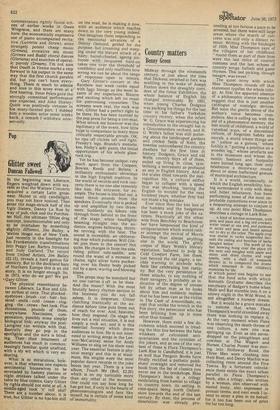Country matters
Benny Green
Midway through the nineteenth century, at just about the time that Dickens, swathed in furs, was scuttling in the wake of Joseph Paxton down the draughty corridors of the Great Exhibition, the whole balance of English life changed irrevocably. By 1851, when young Charles Dodgson was packing his things for the last time in his father's Yorkshire country rectory, when the infant W. G. Grace was experiencing his introduction to the straight bat in a Gloucestershire orchard, and H. G. Wells's father was still pottering about the landscaped gardens and cricket fields of Kent, the townies outnumbered the country dwellers for the first time in history. Dodgson, Grace and old Wells, country boys all of them, ended up living in cities, symbolising a movement as profound as any in English history. And as the scales tilted towards the metropolitan life, a cultural edifice began to collapse with a speed that was shocking, leaving the English to wonder for the next hundred years, whether they. had not made a big mistake.
Ever since then the lost lore of the hamlets and the hedgerows has been a stock joke of the satirists. Practically all the urban wits from Benchley to Beachcomber have lampooned the kind of antiquarianism which would rather attempt the revival of Morris Dancing than almost anything else in the world. The grisly corpse of Mary Webb's literary reputation, battered to pulp by Cold Comfort Farm, lies there, just beyond the old pigsty, a terrible warning to anybody who feels like celebrating lost rusticity. But the very persistence of these attacks, to say nothing of their savagery, is probably an indication of the degree of unease felt by urban man as he looks about him and suddenly realises that he has been cast as the victim
in The Cash of Amontillado, except that unlike the wretch in the
Poe story, the persecutor who has been bricking him up is none other than himself.
However, there exist a few documents which succeed in tread ing the thin line between the false whiskers of calculated antiquarianism and the cynicism of the jokers, and as one of the very best of these is Flora Thompson's Lath Rise to Candleford, it is just as well that Penguin Books have finally rectified a pathetic publishers' oversight and removed the book from the list of classics you never see in the bookshops. Miss Thompson's book is a trilogy modulating from hamlet to village to country town, its setting in time-space being north Oxford shire towards the end of the last century. By then, the process of dissolution was already pro
ceeding at too furious a pace to be arrested, but there were still large areas where the march of concrete was still only a distant rumour. Writing with the hindsight of 1939, Miss Thompson says of the villagers of her childhood, "round them as part of their lives were the last relics of country customs and the last echoes of country songs, ballads and game rhymes. This last picking, though meagre, was sweet."
The quiet irony with which Miss Thompson rounds off that statement typifies the whole trilogy. At first the apparent absence of a philosophic stance seems to suggest that this is just another catalogue of nostalgic devices. But soon the gentle drone of the author's voice becomes compulsive. She is calling up, with the aid of a phenomenal memory, the lost world of childhood, a world of vanished ways, of a discredited culture, of forgotten habits and morals, a world where things are as "yellow as a guinea," where futility is "putting a poultice on a wooden leg," whose artefacts are in the museums and whose domestic bastions and footpaths were buried long ago, their only headstone a motorway roundabout or some halfwitted gesture of municipal architecture.
It is a world, incidentally, in which the English sensibility, having surrendered it only with deep and bitter reluctance, has been performing some of the most improbable contortions ever since in a despairing attempt to conjure it up. At one point Miss Thompson describes a cottage in Lark Rise:
. a kind of kitchen-storeroom, with pots, and pans and a big red crockery water vessel at one end, and potatoes in sacks and peas and beans spread out to dry at the other. The apple crop was stored in racks suspended beneath the ceiling and bunches of herbs dangled below. . . . The scent of the last brewing hung over the place till the next and mingled with apple and onion and dried thyme and sage smells, with a dash of soapsuds thrown in, to compound the aroma which remained in the children's memories for life.
at which point one begins to see that the fond ache with which Kenneth Grahame describes the sanctuary of Badger's home when Mole and Rat stumble into it on a snowy night in the Wild Wood, is not altogether a nursery dream.
But it would be a grave mistake to assume that when Flora Thompson's world crumbled away there was nothing to replace it. At the very moment when Flora was observing the death-throes of one culture, a new one was springing up. Even as she eavesdropped on the ploughboys and cowmen at The Wagon and Horses, Charles Pooter was moving into Holloway Road, the Three Men were climbing into their Boat, and Denry Machin was collecting rents around the Five Towns. By a fortunate coincid-' ence there exists the exact urban parallel to Flora Thompson's book, also a trilogy, also written by a woman, also observed with muted irony, also expressed in prosaic terms, and next week I in-.
• tend to enter a plea in its behalf, for it too has been out of print for far too long.


































 Previous page
Previous page